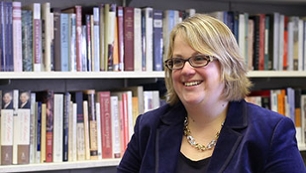Recognizing history as more than just facts
News

About this series:
Taking on Tomorrow was created to showcase the expertise, scholarship and research of faculty in all disciplines at Madison. A number of factors determine who will be in the spotlight at any given time and what aspect of their work will be highlighted. In this installment, we feature Dr. Rebecca Brannon, assistant professor of history and interdisciplinary liberal studies.
To nominate a faculty member to be featured in "Taking on Tomorrow," please e-mail Eric Gorton at gortonej@jmu.edu. Please provide a brief explanation of why you are nominating this faculty member. Self nominations are encouraged.

For Dr. Rebecca Brannon, assistant professor of history and interdisciplinary liberal studies, research is about more than reading old texts and learning about facts dealing with American colonialism and the American Revolution, it’s about studying human beings and finding out how they tick.
Historical research is about understanding that even if people who lived over 200 years ago could think differently and still change the world, then we can, too. Thankfully, James Madison University is the perfect place for Brannon to conduct her research. According to Brannon, “[JMU] is a university that values teaching and research . . . lots of universities give lip service to the idea that they value both, but don’t.”
She appreciates that JMU, and particularly her department, offers resources for research. Virginia is a place that values history, and many of its citizens are interested in its role in the Revolution, the Civil War and early presidents. “This is a part of the country where a person can travel to Virginia, Maryland and Pennsylvania attractions, battlefields and historic sites for research,” Brannon said, who added that she is pleased to inform colleagues that she teaches at the university named for the Father of the U.S. Constitution.
Specifically, Brannon conducts research into the aftermath of the American Revolutionary War, looking at how the Loyalists in South Carolina managed to stay in the United States even after being on the losing side of the conflict. While her research about South Carolina does not overlap directly into her classroom, the overall question about “how people achieved community and get along with people they might not really like and trust” guides a lot of her teaching.
While teaching in a college classroom setting, Brannon finds that there is plenty of room for open-ended questions in discussion. “What historians teach in college is not just an easy multiple choice question . . . it’s ‘why did this happen when it did, and what were people thinking about it?’” Brannon explained, “I am able to talk about darker areas of the American past, and I’m able to talk about the gray areas . . . I try very hard to give relatively open-ended questions to students…I already know what I think, but it’s time for my students to help figure out what they think.”
Brannon was not always involved in history, however. She began her undergraduate college experience as a biology major and enjoyed the classes, but did not like how repetitive the lab work was. She’s always been interested in history, though, and realized that she needed to follow her passion and become a history major. When asked why she loves history so much, Brannon could not help but smile. “I’ve always loved history. I particularly love the 18th century. You can see modernity emerge toward the end of the 18th century. They have the same fundamental ways of thinking about the world . . . there’s a sense that everybody is an individual.” America’s sense of individualism stretches far back to the 18th century, and is prevalent in the research that Brannon does on the Loyalists in the South.
There is so much more to the story of the Loyalists that Brannon ended up writing a book about it. The book will be released in September 2016, and it covers her research into how the Loyalists utilize careful historical manipulation, where the people worked hard to get their pasts buried and eventually succeeded.
Beyond her book being released next year, Brannon is also working on two other book projects. The first is a collection of essays she is in the process of editing. These essays cover the Loyalists in a much greater perspective, from Loyalist reintegration in the South, to religion and what happened to the Loyalists who fled to Canada. The second book is on a different subject: how in the eighteenth century, the young men who would create the American Revolution grew up expecting to be honored as old men, but as they got hold they found people thought they had become “used up and done with.”
When many people hear the word “research,” they may automatically think in terms of scientific research. However, historical research holds a great deal of value as well. It helps to connect our present selves to the past and assist in understanding how our nation came to be the way it is today. Brannon considers herself a humanist, and cares about studying humans because she finds them fascinating.
According to Brannon, psychologists and historians alike are “just trying to find out what makes us humans tick.” When it comes to the idea of historical research helping us to avoid making past mistakes, Brannon said, “I think we’re pretty good at making mistakes again and again. But maybe that’s because we humans have certain faults . . . and I do think history connects us with who we are.”
When Brannon is discussing her research or her teachings in the classroom, it is easy to see how passionate she is about these subjects. For her, history is much more than a textbook filled with memorized dates and facts. History is about understanding the “why” of an event and engaging with her students in order to allow them to feel invested in the discussion at hand.
By Sam Roth (’17), JMU Public Affairs

